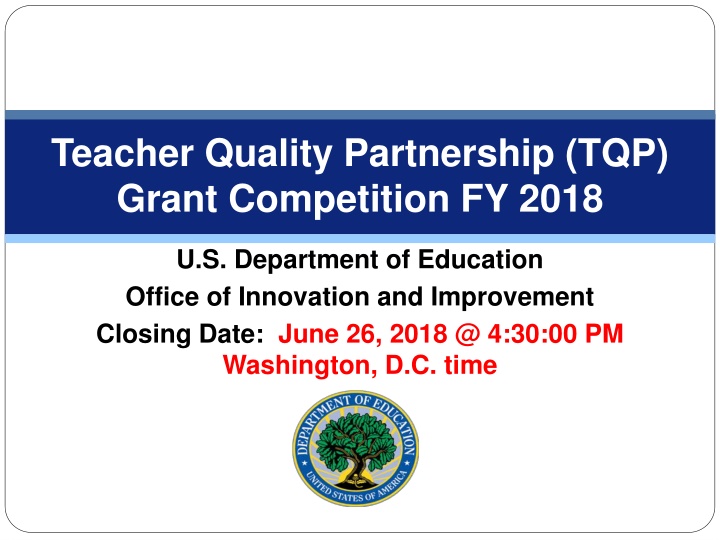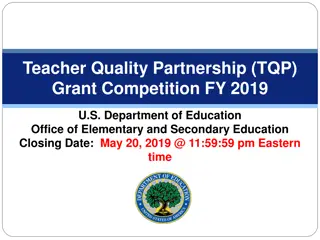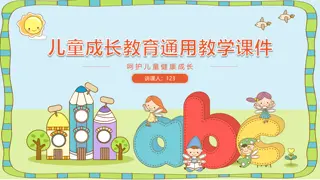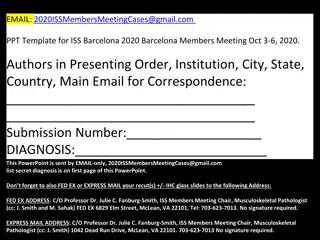
U.S. Department of Education Teacher Quality Partnership (TQP) Grant Competition FY 2018 Details
Learn about the U.S. Department of Education's Teacher Quality Partnership (TQP) Grant Competition for Fiscal Year 2018. Discover important dates, requirements, application instructions, and selection criteria for this grant opportunity. Get insights on maximizing points through quality project services, design, management plan, and evaluation. Access resources and agenda for the webinar to enhance your application preparation.
Download Presentation

Please find below an Image/Link to download the presentation.
The content on the website is provided AS IS for your information and personal use only. It may not be sold, licensed, or shared on other websites without obtaining consent from the author. If you encounter any issues during the download, it is possible that the publisher has removed the file from their server.
You are allowed to download the files provided on this website for personal or commercial use, subject to the condition that they are used lawfully. All files are the property of their respective owners.
The content on the website is provided AS IS for your information and personal use only. It may not be sold, licensed, or shared on other websites without obtaining consent from the author.
E N D
Presentation Transcript
Teacher Quality Partnership (TQP) Grant Competition FY 2018 U.S. Department of Education Office of Innovation and Improvement Closing Date: June 26, 2018 @ 4:30:00 PM Washington, D.C. time
Note About These Slides The slides presented on this webinar will be available for download on the TQP webpage. Applicants are strongly encouraged to download the TQP TQP Application Package from the TQP webpage and review it in its entirety. The TQP Application Package provides instructions needed to apply for this TQP grant. http://innovation.ed.gov/what-we-do/teacher-quality/teacher-quality-partnership/ Note: These slides are intended as guidance only and do not impose any requirements beyond those included in the language of 20 U.S.C. 1021 1022h, the NIA, and any other applicable provisions established in rules for this competition. Please refer to the official documents published in the Federal Register. 2
General TQP Competition Q&A Applicants are strongly encouraged to read the TQP Notice Inviting Applicants in its entirety. Applicants are strongly encouraged to read the TQP Frequently Asked Questions (FAQ) document in its entirety as it addresses many questions that applicants may ask. The FAQ Document will be available on the TQP webpage shortly after the TQP NIA is published. If your questions are not answered in the TQP FAQ document, you may email them to the TQP program inbox at TQPartnership@ed.gov. Please do not wait until the last minute to email your questions. 3
Agenda for This Webinar I. TQP Program Purpose and Overview II. Eligibility Requirements III.TQP Program Requirements IV. FY 18 Program Priorities V. Selection Criteria & Scoring VI. Competition Reminders and Resources 4
TQP Selection Criteria & Scoring Applicants should read the TQP NIA for full TQP Selection Criteria language. The Selection Criteria are the criteria against which peer reviewers will score each application The Department selects grantees based on peer reviewer scores. It is critical to clearly address the Selection Criteria. 5
TQP Selection Criteria Point Allocation Selection Criteria Max Points A.Quality of Project Services 15 40 B.Quality of Project Design C.Quality of the Management Plan 25 D.Quality of the Project Evaluation 20 100 Total Points 6
Selection Criterion: Project of Project Services Are project partners working together to ensure the project is successful? The extent to which the services to be provided by the proposed project involve the collaboration of appropriate partners for maximizing the effectiveness of project services. The extent to which the services to be provided by the proposed project reflect up-to-date knowledge from research and effective practice. Have we researched and used effective and current teaching styles? 7 7
Selection Criterion: Project of Project Services The extent to which the training or professional development services to be provided by the proposed project are of sufficient quality, intensity, and duration to lead to improvements in practice among the recipients of those services. Are the services we are providing of high quality and are they going to be effective in improving student outcomes. 8 8
Selection Criterion: Quality of the Project Design The extent to which the proposed project demonstrates a rationale? Does our Logic Model reflect research and evaluation that support your project design being effective? The extent to goals, objectives, and outcomes to be achieved by the proposed project are clearly specified and measureable. Are your project objectives S.M.A.R.T? Balance of Costs with Outcomes of Project 9
Selection Criterion: Quality of the Project Design The extent to which the proposed project is designed to build capacity and yield results that will extend beyond the period of Federal financial assistance. Can this program be sustained without Federal funds? The extent to which the proposed project represents an exceptional approach to the priority or priorities established for this competition. Have all the absolute priority requirements been addressed in an exception and innovative way? Balance of Costs with Outcomes of Project 10
Selection Criterion: Quality of the Management Plan and Personnel The adequacy of the management plan to achieve the objectives of the proposed project on time and within budget, including clearly defined responsibilities, timelines, and milestones for accomplishing the project tasks. Is there a viable plan to carry out the proposed project? The potential for the incorporation of project purposes, activities, or benefits into the ongoing program of the agency or organization at the end of Federal funding. Are all project pieces connecting and do we have a plan to continue this work long term? 11
Selection Criterion: Quality of the Management Plan and Personnel The adequacy of support, including facilities, equipment, supplies and other resources, from the applicant organization or the lead applicant organization. Do you have full support from project partners to make the proposed project a success? 12
Selection Criterion: Quality of Project Evaluation The extent to which the methods of evaluation will provide valid and reliable performance data on relevant outcomes. Are key questions being asked that will provide data to support project outcomes? The extent to which the methods of evaluation are thorough, feasible, and appropriate to the goals, objectives, and outcomes of the proposed project. What data will be generated to help determine if the project has meet its goals? 13
Additional Evaluation Plan Guidance Evaluation plans should be clear and detailed. Evaluation plans should include objectives that are S.M.A.R.T (Specific, Measureable, Attainable, Relevant, and Timely) Evaluation plans should include key questions and proposed methods for addressing them. Evaluation plans should link to a Logic model (Project Design) connecting inputs with intermediate and final outcomes. Evaluation plans should include a summary of data to be collected and how it will be collected. Evaluation plans should include a justification for evaluation costs. Evaluation plans should include qualifications for the desired evaluation staff. 14
Sample Logic Model Resources http://ies.ed.gov/ncee/edlabs/regions/pacific/pdf/REL_2014025.pdf http://ies.ed.gov/ncee/edlabs/regions/pacific/pdf/REL_2014007.pdf http://ies.ed.gov/ncee/edlabs/regions/pacific/pdf/REL_2014011.pdf http://ies.ed.gov/ncee/edlabs/regions/pacific/pdf/REL_2014034.pdf http://relpacific.mcrel.org/resources/elm-app http://relpacific.mcrel.org/resources/pomt-app https://tqp.grads360.org/#program/2017-tqp-new-grantee-meeting https://tqp.grads360.org/services/PDCService.svc/GetPDCDocumentFil e?fileId=28615 https://www.wkkf.org/resource-directory/resource/2006/02/wk-kellogg- foundation-logic-model-development-guide *Resources are from the Institute of Educational Sciences at the U.S. Department of Education and AEM Education Services. 15
Selection Criteria Questions If you have questions about TQP Selection Criteria, please first review the TQP FAQ document on the TQP webpage. If your question is not answered in the FAQ document, you may email your questions to TQPartnership@ed.gov. 16
TQP Competition Resources TQP Program Webpage http://innovation.ed.gov/what-we-do/teacher-quality/teacher-quality- partnership/ FY 18 TQP Notice Inviting Applications (NIA) FY 18 TQP Application Package TQP Application Checklist TQP Optional Program Checklists (4) Optional Eligible Partnership AND IHE Verification Checklist Optional TQP General Application and Program Requirements Checklist Optional High-Need LEA AND High-Need School Checklist Option Absolute Priority Checklists Match Documentation Forms 17
TQP Competition Resources FY 18 TQP FAQ Document TQP FAQ document will be available on the TQP webpage shortly after the TQP NIA has been published. Additional TQP questions may be sent to: TQPartnership@ed.gov Please do not wait unit the last minute to send us questions about your application. Pre-recorded Information Webinars. Currently funded TQP projects. FY 14 and FY 16 18
TQP Competition Reminders Closing Date: June 26, 2018 at 4:30:00 pm Washington, D.C. time. Late applications WILL NOT be reviewed. FY 18 Intent to Apply Due Date: June 11, 2018 Send Intents to: TQPartnership@ed.gov All applications must be submitted electronically using Grants.gov. Grants.gov Help Desk: 1-800-518-4726. 19
Resources and Reminders Questions If you have questions about TQP competition Resources or Reminders, please review the TQP FAQ document first on the TQP webpage. If your question is not answered in the FAQ document, you may email your question to TQPartnership@ed.gov. 20
Thank you for your interest in the TQP Grant Program. Best Wishes on a successful TQP application submission. Closing Date: June 26, 2018 @ 4:30:00 PM Washington, D.C. time
















